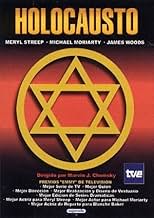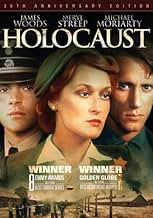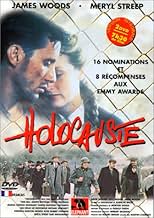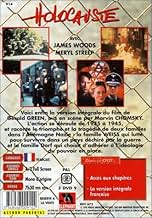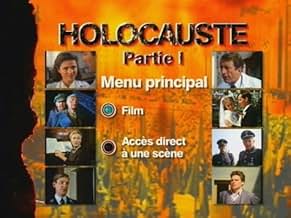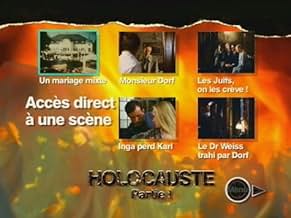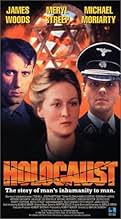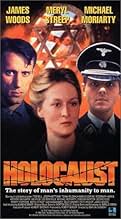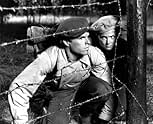A saga da luta de uma família judia para sobreviver ao horror da marginalização sistemática e do extermínio de sua comunidade pela Alemanha nazista.A saga da luta de uma família judia para sobreviver ao horror da marginalização sistemática e do extermínio de sua comunidade pela Alemanha nazista.A saga da luta de uma família judia para sobreviver ao horror da marginalização sistemática e do extermínio de sua comunidade pela Alemanha nazista.
- Ganhou 8 Primetime Emmys
- 18 vitórias e 11 indicações no total
Explorar episódios
Enredo
Você sabia?
- CuriosidadesThe term "Holocaust" didn't exist in the German language until the 1980s. Due to the great success of this mini-series, it became common knowledge, and was chosen as "word of the year 1979" by the "Gesellschaft für deutsche Sprache" (Society for German Language).
- Citações
Moses Weiss: I have the right name but I'm afraid I can't lead you to the promised land.
- Versões alternativasPolish authorities protested against a scene in which soldiers dressed in Polish uniforms executed Jewish prisoners. The poles didn't have any "Quisling army" during the war. The scene was trimmed and now shows the rifles and the arms of the soldiers in question. Even so, both versions apparently remained in circulation as Danish TV originally showed the original version, and Swedish TV the trimmed version within weeks of each other.
- ConexõesFeatured in The 30th Annual Primetime Emmy Awards (1978)
Avaliação em destaque
Holocaust was a typical made for TV mini series that were made back in the late 1970's. It followed on the back of the well acclaimed series ROOTS and was later was followed by the WINDS OF WAR and others. Having seen this recently although it's still effective and interesting Holocaust looks a bit wooden and dated by today standards. In addition in the 30 years since there have been a lot of documentaries, movies and other big screen stuff which has perhaps detailed the horrors in a more graphic way as well as providing an even more nightmarish and depressing insight into what Europe's Jews had to endure during Hitler's reign.
It's mostly an American and British cast, typically the Weiss family and the Jews are played by the American actors and the Brits play the Germans. Some of them were well known at the time i.e. Fritz Weaver, Sam Wanamaker and T.P. McKenna . Others such as Ian Holm, James Woods and Meryl Streep would soon become household names.
It follows the fait of the Weiss family and details on an individual basis how they all coped with the changing anti-Semitic conditions in Germany and their suffering until the war was over. Also a German called Erik Dorf was added to the story who was destined for a legal career but decided to join the SS. He moved through the ranks and became one of the most enthusiastic defenders of the final solution. To some extent they were trying to rationalize how well educated people became brain washed. He was played by Michael Moriarty and did not come across as evil, certainly not at the beginning. He never personally carried out killings but just gave orders and watched from the side lines. Watching the change in him as the episodes unfolded is chilling.
Over the years there have been numerous documentaries and movies made which show the hell of the Holocaust but what this series did was tell people things that weren't widely known back in 1978. Although it was well known that the Jews were gassed and put into concentration camps most of my knowledge about this period as well as the war as a whole was based on war films and the British documentary series THE WORLD AT WAR. HOLOCAUST depicts the events that unfolded and how the Jews found themselves in such a hopeless situation! By January 1942 there was to be a fully fledged war against the Jews. The methods of disposal were seemed to be too slow and crude. More efficient ways of extermination had to be found to accelerate the process and make the policy more efficient now that Hitlers initial objectives were unraveling on the eastern front.
When I first watched Holocaust I wondered why the Jews didn't put up more of a fight, why so many of them just went to their deaths? Now watching it today two things struck me. After being dehumanized, humiliated, starved and stripped of dignity, they were simply exhausted, frightened and resigned to their fait. Also, most of them were children, old men and women who up against armed soldiers had no chance. Also their predicament was difficult, where do you hide wearing striped pajamas or a star of David on your tunic? Many escapees were betrayed by neighbors and non-Jews. Indigenous governments either through fear of because of Nazi sympathy just capitulated and cooperated with German requests for the Jews to be deported. Events such as Sobibor where out of the 600 who initially escaped only 60 survived the war, not a great success rate. Also, the Warsaw uprising which was eventually crushed in 1944 only highlighted the futility of their position!
The other point and this arouses controversy is that more people died in the war itself, why concentrate on the holocaust? It's true that many others, political prisoners, and other ethnic groups were massacred too. Also, more money and lives were spent and lost during the war than the killing of the 6 ½ million Jews, why the distinction?
Firstly, the Jews were the largest ethnic group that were killed despite being dispersed all over Europe. Secondly their treatment started way back in the 1930's and of course accelerated up until and in some cases even after the German surrender. Jews were being Killed, massacred and forced on death marches right up until the end of the war. Thirdly, the Germans got the art of killing these none combatants down to a fine art, they industrialized death and suffering in such a way that I don't know if there is anything historically to compare with it? Every step of the way they took away hope and there was a cruel deception right the way down the line, all able bodied were concentrated and enslaved until no longer useful and the others were killed quickly or slowly, which ever suited . By the time they realized what was going on it was too late! They simply never believed the Germans would do such a thing!
It was cruelty towards an ethnic group, whole familys which included, the old, the sick and children were all tormented. The perpetrators of this policy and it's executioners took delight in what they were doing, yes, a sense of delight is the right word. I watched a documentary a couple of years ago where a survivor of a camp a Dutch Jew, I think his name was Joseph Greenberg learned a year after the end of the war that his family were probably all killed on the same day they arrived at the death camp. It still haunted him all these years later. This is the enduring legacy of the perverse and twisted war against Europe's Jews. Well worth watching!
It's mostly an American and British cast, typically the Weiss family and the Jews are played by the American actors and the Brits play the Germans. Some of them were well known at the time i.e. Fritz Weaver, Sam Wanamaker and T.P. McKenna . Others such as Ian Holm, James Woods and Meryl Streep would soon become household names.
It follows the fait of the Weiss family and details on an individual basis how they all coped with the changing anti-Semitic conditions in Germany and their suffering until the war was over. Also a German called Erik Dorf was added to the story who was destined for a legal career but decided to join the SS. He moved through the ranks and became one of the most enthusiastic defenders of the final solution. To some extent they were trying to rationalize how well educated people became brain washed. He was played by Michael Moriarty and did not come across as evil, certainly not at the beginning. He never personally carried out killings but just gave orders and watched from the side lines. Watching the change in him as the episodes unfolded is chilling.
Over the years there have been numerous documentaries and movies made which show the hell of the Holocaust but what this series did was tell people things that weren't widely known back in 1978. Although it was well known that the Jews were gassed and put into concentration camps most of my knowledge about this period as well as the war as a whole was based on war films and the British documentary series THE WORLD AT WAR. HOLOCAUST depicts the events that unfolded and how the Jews found themselves in such a hopeless situation! By January 1942 there was to be a fully fledged war against the Jews. The methods of disposal were seemed to be too slow and crude. More efficient ways of extermination had to be found to accelerate the process and make the policy more efficient now that Hitlers initial objectives were unraveling on the eastern front.
When I first watched Holocaust I wondered why the Jews didn't put up more of a fight, why so many of them just went to their deaths? Now watching it today two things struck me. After being dehumanized, humiliated, starved and stripped of dignity, they were simply exhausted, frightened and resigned to their fait. Also, most of them were children, old men and women who up against armed soldiers had no chance. Also their predicament was difficult, where do you hide wearing striped pajamas or a star of David on your tunic? Many escapees were betrayed by neighbors and non-Jews. Indigenous governments either through fear of because of Nazi sympathy just capitulated and cooperated with German requests for the Jews to be deported. Events such as Sobibor where out of the 600 who initially escaped only 60 survived the war, not a great success rate. Also, the Warsaw uprising which was eventually crushed in 1944 only highlighted the futility of their position!
The other point and this arouses controversy is that more people died in the war itself, why concentrate on the holocaust? It's true that many others, political prisoners, and other ethnic groups were massacred too. Also, more money and lives were spent and lost during the war than the killing of the 6 ½ million Jews, why the distinction?
Firstly, the Jews were the largest ethnic group that were killed despite being dispersed all over Europe. Secondly their treatment started way back in the 1930's and of course accelerated up until and in some cases even after the German surrender. Jews were being Killed, massacred and forced on death marches right up until the end of the war. Thirdly, the Germans got the art of killing these none combatants down to a fine art, they industrialized death and suffering in such a way that I don't know if there is anything historically to compare with it? Every step of the way they took away hope and there was a cruel deception right the way down the line, all able bodied were concentrated and enslaved until no longer useful and the others were killed quickly or slowly, which ever suited . By the time they realized what was going on it was too late! They simply never believed the Germans would do such a thing!
It was cruelty towards an ethnic group, whole familys which included, the old, the sick and children were all tormented. The perpetrators of this policy and it's executioners took delight in what they were doing, yes, a sense of delight is the right word. I watched a documentary a couple of years ago where a survivor of a camp a Dutch Jew, I think his name was Joseph Greenberg learned a year after the end of the war that his family were probably all killed on the same day they arrived at the death camp. It still haunted him all these years later. This is the enduring legacy of the perverse and twisted war against Europe's Jews. Well worth watching!
- dgrahamwatson
- 14 de jan. de 2007
- Link permanente
Principais escolhas
Faça login para avaliar e ver a lista de recomendações personalizadas
- How many seasons does Holocaust have?Fornecido pela Alexa
Detalhes
- Data de lançamento
- País de origem
- Idiomas
- Também conhecido como
- Holocaust
- Locações de filme
- Empresa de produção
- Consulte mais créditos da empresa na IMDbPro
Contribua para esta página
Sugerir uma alteração ou adicionar conteúdo ausente



